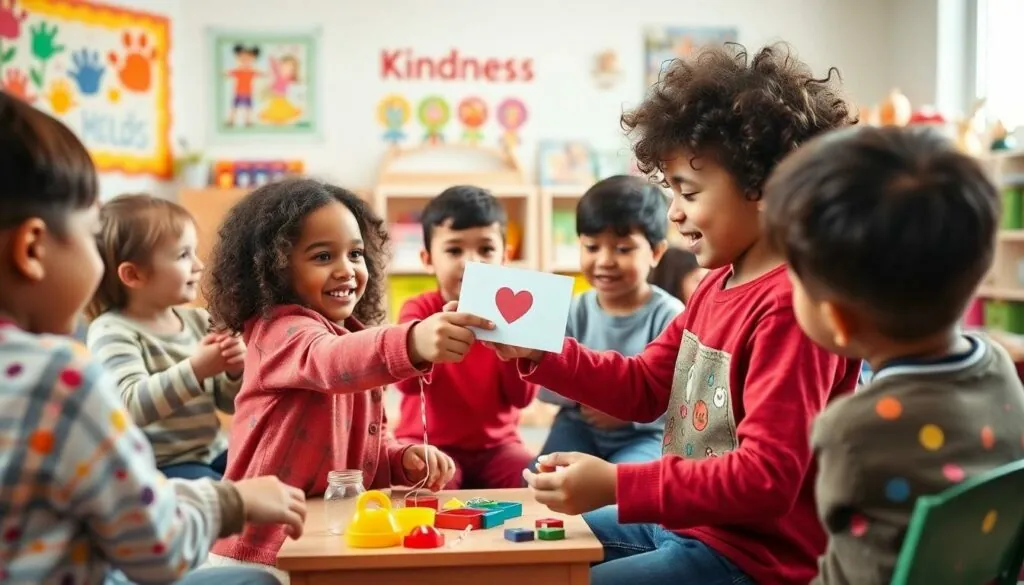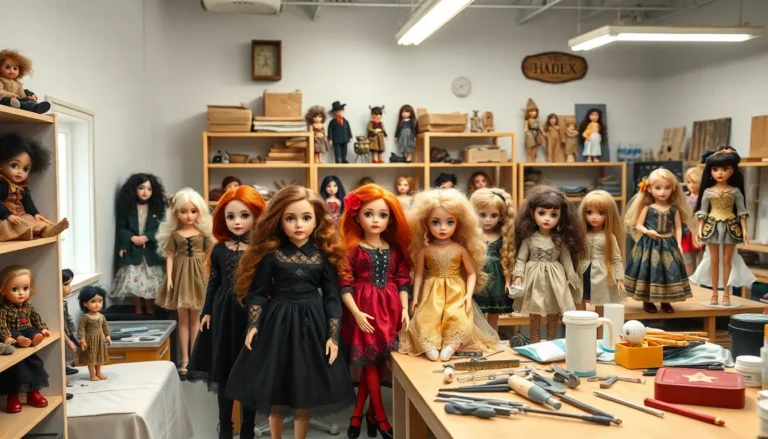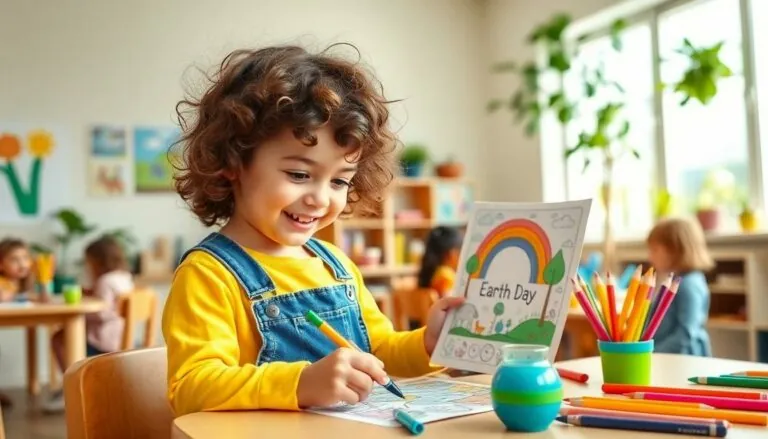Table of Contents
ToggleIn a world where sharing a snack can feel like a high-stakes negotiation, teaching preschoolers the art of kindness is more important than ever. Imagine a classroom filled with tiny humans, each armed with a heart as big as their imaginations, ready to spread joy like confetti. Kindness activities for preschoolers not only nurture empathy but also transform little rascals into mini superheroes of compassion.
Overview of Kindness Activities for Preschoolers
Kindness activities serve as essential tools for fostering empathy in preschoolers. Creative exercises, such as sharing toys, cultivate a sense of community. Simple acts like complimenting a classmate build self-esteem and reinforce positive interactions.
Storytelling remains a powerful method to illustrate kindness. Engaging narratives about caring characters inspire children to emulate these traits. Role-playing scenarios provide hands-on experiences, allowing kids to practice being kind in various situations.
Group projects, like making cards for local residents, encourage teamwork and enhance social skills. Helping one another in activities, such as cleaning up the classroom, instills a sense of responsibility. Participating in kindness challenges, such as “Random Acts of Kindness Week,” promotes awareness and active participation.
Discussing feelings and expressing emotions through art helps preschoolers understand the impact of kindness. External community service projects offer opportunities for children to see real-world applications of compassion.
Ultimately, consistent engagement in kindness activities shapes preschoolers into empathetic individuals. Opportunities for learning through play create memorable experiences that instill values of kindness and compassion. Each activity empowers children to become “mini superheroes of compassion” as they interact with peers and the community.
Benefits of Kindness Activities
Kindness activities provide significant benefits for preschoolers, promoting empathy and compassion in their development. Engaging in these activities enhances various aspects of their growth.
Social Development
Social skills flourish as preschoolers engage in kindness activities. Sharing toys not only encourages cooperation but also fosters a sense of belonging among peers. Collaborative projects, like crafting cards for residents, enhance teamwork, allowing children to learn from each other. Participating in group games reinforces the value of empathy as children navigate social dynamics. Exposure to role-playing scenarios further develops their ability to empathize, equipping them to manage real-world interactions effectively. These experiences lay a strong foundation for healthy relationships.
Emotional Growth
Emotional growth accelerates when preschoolers practice kindness. Expressing emotions through art or storytelling helps children process their feelings. They become more aware of their emotional responses as they discuss how their actions affect others. Engaging in activities, such as complimenting classmates, boosts self-esteem and encourages positive self-worth. Additionally, practicing kindness through community service cultivates gratitude, reinforcing their understanding of compassion. Overall, these activities empower children to better navigate their emotions, leading to resilient and kind-hearted individuals.
Creative Kindness Activities
Kindness activities engage preschoolers in learning empathy through play and creativity. Exploring different methods fosters a compassionate environment.
Art and Craft Projects
Art projects ignite creativity while teaching kindness. Children can create cards with uplifting messages for local residents, spreading joy throughout the community. Using materials like recycled paper, they learn the value of resourcefulness and teamwork. Crafting heart-shaped decorations to share with family or friends strengthens bonds while encouraging thoughtful expressions. Simple projects, such as decorating kindness rocks, help kids understand the power of small gestures. Demonstrating care through art offers preschoolers tangible ways to share their feelings and inspire others.
Storytelling Sessions
Storytelling captivates children and illustrates the significance of kindness. Engaging narratives, featuring characters who show empathy, resonate with young listeners. Selecting diverse stories, from classic tales to modern fables, exposes them to various perspectives on kindness. Through discussion after the stories, kids reflect on their own actions and feelings. Story-based activities, like role-playing scenes, immerse them in compassionate scenarios. This interactive approach deepens their understanding of kindness while allowing children to explore complex emotions. Overall, storytelling effectively cultivates empathy in preschoolers, fostering valuable social skills.
Active Kindness Activities
Active kindness activities empower preschoolers to practice compassion in engaging ways. These activities foster connection and build empathy while promoting teamwork and communication.
Community Service Ideas
Community service ideas serve as impactful kindness activities for preschoolers. They can create greeting cards for local residents, spreading cheer and joy. Planting flowers in community gardens allows children to contribute beauty to their environment. Visiting animal shelters offers opportunities to learn about care and responsibility for pets. Collecting items for food banks teaches the importance of generosity and sharing. Setting up a recycling station in the classroom emphasizes the value of caring for the planet and others in the community. Each of these activities reinforces the essence of kindness through tangible actions.
Daily Acts of Kindness
Daily acts of kindness encourage preschoolers to integrate compassion into their routines. Simple gestures like complimenting peers build self-esteem and create a positive atmosphere. Taking turns with toys cultivates patience and respect. Offering to help a classmate with a task fosters collaboration and teamwork. Writing thank-you notes to teachers instills gratitude and appreciation. Ultimately, daily kindness activities highlight the importance of small actions, reinforcing the notion that everyone can make a difference through simple, thoughtful deeds.
Incorporating Kindness into Daily Routines
Integrating kindness into daily routines offers preschoolers consistent opportunities to practice compassion. Simple gestures build foundational skills in empathy, such as complimenting peers during circle time or sharing toys in play areas. Taking turns while playing fosters cooperation and reinforces the importance of being considerate.
Encouraging children to help classmates with tasks helps them develop a sense of responsibility and community. Creating thank-you notes for teachers after lessons cultivates gratitude. Frequent discussions about feelings enable them to express emotions and reflect on their actions.
Walking to the playground can become an opportunity for kindness, where children can point out positive attributes in one another. Involving preschoolers in small group activities strengthens their social bonds and encourages teamwork. Including music and movement can also enhance these experiences, allowing children to express kindness through dance and song.
Establishing “kindness corners” in classrooms provides a dedicated space where children can engage in activities that promote kindness. Here, they can create art that expresses their emotions, share compliments, or read stories about caring characters. Daily reminders of the importance of their actions help reinforce the message of compassion.
Routine reminders about the impact of small actions solidify their understanding of kindness. Adults modeling kind behavior provides a strong example for preschoolers to emulate. Each day becomes a new opportunity for preschoolers to practice kindness effortlessly, fostering their emotional intelligence and nurturing compassionate individuals.
Conclusion
Fostering kindness in preschoolers lays the foundation for a compassionate future. Through engaging activities that promote empathy and teamwork, children learn the significance of their actions and how they impact others. These experiences not only enhance social skills but also encourage emotional growth, helping young ones navigate their feelings effectively.
By integrating kindness into daily routines and creating dedicated spaces for kindness activities, educators and parents can nurture these essential values. As preschoolers participate in acts of kindness, they become more aware of their surroundings and the importance of community. Ultimately, these small gestures contribute to building a more caring and connected world.







